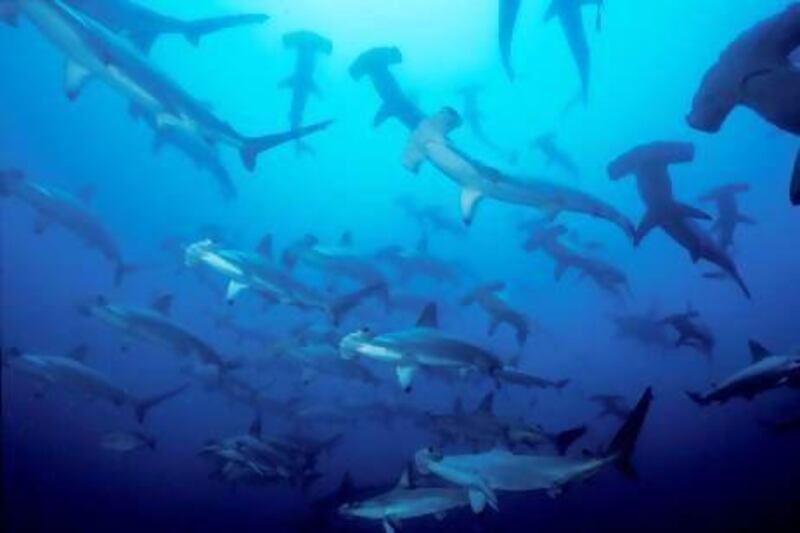DUBAI // Far from being the ruthless scourge of mankind that films such as Jaws would have you think, sharks have inspired important new discoveries and could even hold the key to curing cancer.
"We can benefit from sharks other than just by consuming their meat and fins," says Dareen Al Mojil, a researcher from Kuwait. "We have learnt a great deal from sharks and there are many more potential ideas and projects to come."
Sharks have inspired product design, scientific research and technological advances, she told delegates from across the region and beyond at the Shark Conservation in Arabia workshop in Dubai.
For example, the Australian company BioPower Systems has developed technology that uses structures based on the shape of a shark's caudal, or tail, fin to generate power from tidal movements.
"The shape and the functionality of the caudal fin - how sharks use it to convert the energy of the inner body into movement - inspired scientists to produce things that look like caudal fins," Ms Al Mojil said.
"They will be installed in tidal regions and they will have the ease of movement to convert tidal energy and store it as another form of energy."
Shark skin is another major source of inspiration. The scales are arranged in a diamond arrangement and have grooves that improve streamlining by producing fewer eddies than a smooth surface. This also prevents barnacles attaching themselves to sharks.
The pattern can be implemented in paints that reduce resistance when applied to a ship's hull.
"This will reduce the friction, allow it to move more efficiently and reduce the consumption of fuel, reducing costs," Ms Al Mojil added.
The same pattern can be reproduced in fabrics that resist harmful bacteria and parasites.
"The pattern makes it harder for bacteria, especially harmful bacteria such as E. coli, to colonise. They will be present in small quantities but won't be able to reach an infectious stage.
"The other thing is it makes it harder for larvae to settle on the surface and start to grow, and this can reduce the number of parasites."
And shark antibodies could potentially be used to cure malaria and even cancer, she said.
Ms Al Mojil said that the antibodies of sharks are very useful because they are very similar to the ones in humans, and they tend to tolerate a broader range of temperatures, acidity and alkalinity.
"So they could be used in tablets that could tolerate the harsh environment in the stomach. The cancer research is in its early stages but the malaria study is in its final stages."
Sharks, as apex predators, have an important role to play in maintaining marine ecosystems. Their loss could lead to the types of fish they would normally prey on growing too numerous, which in turn could lead to the destruction of populations of smaller fish their prey consume.
Dr Elsayed Mohamed, regional director at the International Fund for Animal Welfare (Ifaw), said: "If you lose a species you have to expect that you will lose another with him, maybe one or more. It is all one system and species depend on each other.
"Also sharks are important because they clean up the seas. They perform the same role in the ocean as the lion does on land. One of the roles of the lion is that it chooses weak or diseased gazelles and takes them away from the herd, and this makes the gazelle population healthier."
The biggest threat to the survival of sharks is fishing. The fins are highly valued in China, where they are used to make soup. Last month, it was announced by Dr Shelley Clarke that the UAE is now the fourth-largest exporter of shark fins to Hong Kong after Spain, Singapore and Taiwan. Dr Clarke is the world's leading expert on the shark fin trade.
However many other countries around the world are involved in the trade, which is largely unregulated.
Dr Ralf Sonntag, an expert at Ifaw who also spoke at the workshop, said the plight of sharks was not only of concern to those involved in conservation.
"It's also a tourist issue," he added.
"The Red Sea used to be one of the big shark destinations and that's why the push for a diving industry started there. The diving industry is very big in the Red Sea and it is now also quite big in Oman and Fujairah.
"A lot of divers go diving to see sharks, and the disappearance of sharks means divers now go to the Maldives and Mozambique where they can still see sharks, and a lot of tourist dollars flow there."
This point was reinforced by another speaker, the UAE-based marine biologist Rima Jabado, who said: "Some fishermen have been telling me stories about how 15 or 20 years ago you would look out from the coast of Dubai at sunset and you would see fins coming out of the water. I've been diving here for five years and I've never seen a shark, so something's happening."
Dr Sonntag said the image of sharks has never recovered from the harm caused by Steven Spielberg's 1975 blockbuster Jaws.
"I think Jaws is a big problem for sharks because it gives people the impression that sharks are big monsters of the sea, which is not true," he said.
While sharks do attack and kill humans, numerically it is the shark that has far more to fear from mankind.
Statistics compiled by the Shark Attack Survivors organisation show that 17 people died in a total of 118 attacks last year.
In contrast, an average of 38 million sharks and rays are killed by fishermen for their fins each year. "It's not the shark who is the monster," said Dr Sonntag.






